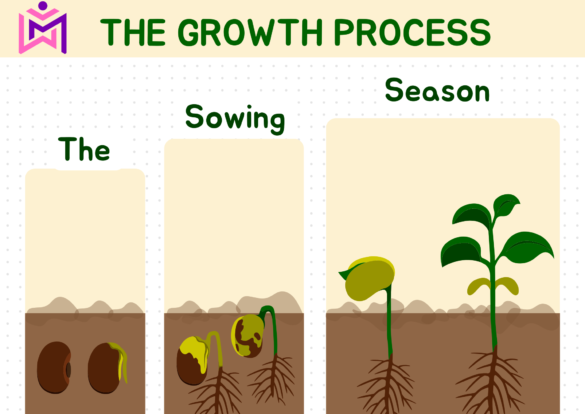Key Focus: The starting point of personal development, akin to planting a seed. This week, we explore the early stages of growth—the immense potential each of us holds, yet the uncertainty, confusion, and vulnerability that often accompany it.
As the seasons change, we find ourselves drawn to the beauty of new beginnings—the kind that arise when we plant a seed in the soil, full of promise yet shrouded in uncertainty. The sowing season, much like the journey of personal growth, is full of potential, yet it asks of us patience, faith, and resilience.
In this first part of our journey, we delve into the “The Sowing Season” and explore what it truly means to embrace the beginning of growth. As we step into personal development, we start with a seed—the spark of an idea, a desire for change, or the raw potential within. Yet, we also step into the unknown, unsure of the path ahead.
In these early stages, growth can feel small, uncertain, and even a little uncomfortable. But this is where the magic begins—the seedling.
The Power of Beginnings and Why Small Steps Matter
Much like the first stirrings of a seed breaking through the soil, our personal growth often starts with tiny, almost imperceptible steps. We don’t always see the fruit of our labor immediately, but that doesn’t mean the work isn’t happening beneath the surface.
In the Bible, Jesus uses the imagery of a seed to illustrate the powerful truth of beginnings:
“Very truly I tell you, unless a kernel of wheat falls to the ground and dies, it remains only a single seed. But if it dies, it produces many seeds.” — John 12:24 (NIV)
The seed may appear small and insignificant at first, but within it is the capacity for tremendous growth. The same is true for us. Our first steps in personal development may feel small or even trivial, but each step, each decision, and each effort brings us closer to the fuller potential we are meant to embody.
Just as the seed must trust the soil to nurture it, we must trust the process of growth—no matter how small the beginning may seem.
Overcoming the Fear of Starting from Scratch
The fear of starting from scratch is often rooted in the pain and vulnerability that come with change. To begin anew requires an intentional decision, much like a seed that must fall to the ground and die in order to grow. In John 12:24, Jesus says:
“Very truly I tell you, unless a kernel of wheat falls to the ground and dies, it remains only a single seed. But if it dies, it produces many seeds.” — John 12:24 (NIV)
For the seed, falling to the ground is not easy. It’s a quiet, almost painful process—an act of surrendering to the unknown. But in that moment of stillness, a transformation begins. The seed doesn’t resist the fall. It chooses to embrace it, trusting that something beautiful will emerge.
As individuals, we too must choose to embrace the discomfort of change and transformation. When we decide to let go of what we know and surrender to the process—however painful or uncertain—it is like the seed’s fall. It’s a quiet moment of surrender. But in the right time, germination begins. From this quiet surrender, new growth takes place, and the fruits of our labor begin to show.
Though the early stages may be painful or humbling, just like the seed, we trust that growth is happening beneath the surface. The harvest season will come—a season full of abundance, clarity, and fruitfulness. The key is to be willing to “fall” in faith, knowing that through surrender and patience, we will see the fruits of our labor in due time.
Embracing the Power of Solitude: The Fear of Being Alone
In John 12:24, Jesus shares a profound truth about growth and transformation: “… it remains only a single seed.” That phrase, “it remains only a single seed,” speaks to a deep and often uncomfortable truth about personal growth: sometimes, in order to grow into our fullest potential, we must embrace the solitude that comes with the sowing season.
We live in a world that often equates success with being part of the crowd, being seen, and fitting in. The fear of being alone or isolated is a powerful force that many of us grapple with, especially in the early stages of personal growth. There is a natural inclination to follow the crowd, to conform, and to seek validation from others. But the reality is that true growth often requires us to stand alone, to be like that single seed—a seed that must fall to the ground, away from the group, and choose a quiet, solitary path of transformation.
Being alone can feel lonely and uncomfortable. It’s in those moments, however, that the seed undergoes its most critical transformation. The seed cannot germinate if it is surrounded by others; it must first face the quiet and solitude of the earth in order to truly begin its journey of growth. Similarly, we often need periods of solitude to hear our own thoughts, to confront our fears, and to truly decide who we want to become—without the pressure or distraction of others.
In a society that prizes popularity and visibility, it can feel as though the act of being alone is a failure or a loss. But in the sowing season, the quiet moments of solitude are essential. They allow us to reconnect with our true selves, to examine our deepest desires, and to focus on the process of growth without the noise of external expectations. It is only in solitude that we are truly able to face the depths of who we are and what we need to become.
As we embrace the “single seed” phase of our journey, we must acknowledge that sometimes, the path of growth requires us to stand apart. It requires us to step away from the noise of the crowd, to let go of the need to please others, and to be okay with being alone. And just as the seed in the soil is quietly preparing for a season of abundance, we too are in the process of transformation.
Though it may feel lonely at times, remember that this period of solitude is not wasted. It is a time of deep preparation, a season of quiet growth—one that will ultimately lead to a harvest, not only for yourself but also for those around you when your growth bears fruit.
The Importance of Patience During Early Stages of Growth
When we plant a seed, we don’t expect it to sprout into a full-grown plant overnight. We wait with patience, nurturing it, trusting that the process is unfolding even when we cannot yet see the results. Similarly, in the early stages of our personal development, growth may not be visible to the eye. It requires faith that the work happening beneath the surface will eventually bear fruit.
Patience is essential. In the Bible, the concept of growth often calls for waiting. As we read in Galatians 6:9:
“Let us not become weary in doing good, for at the proper time we will reap a harvest if we do not give up.”
Personal growth doesn’t happen in an instant. It requires time, patience, and the willingness to trust that, just as a seed takes time to grow into something beautiful, so too will your efforts blossom into something meaningful. The early stages are crucial, and they are not to be rushed. Patience is the quiet faith that growth is happening, even when we can’t see it yet.
Conclusion: Embrace the Process
As we embark on this journey of personal growth, let us remember the wisdom found in John 12:24—the truth that, in the process of letting go of what we know and stepping into the unknown, we create the possibility for abundant growth. This week, embrace the seedling stage. Trust that every small step is leading you toward something greater, and allow yourself the grace to grow at your own pace.
In the coming weeks, we will continue to nurture this growth and explore what it means to develop into the person you are meant to be. But for now, take comfort in knowing that the journey has begun. And like the seed that grows in its time, so will you.
Reflection Question:
What small step can you take this week to nurture your personal growth? How can you embrace the vulnerability of being a seedling?


